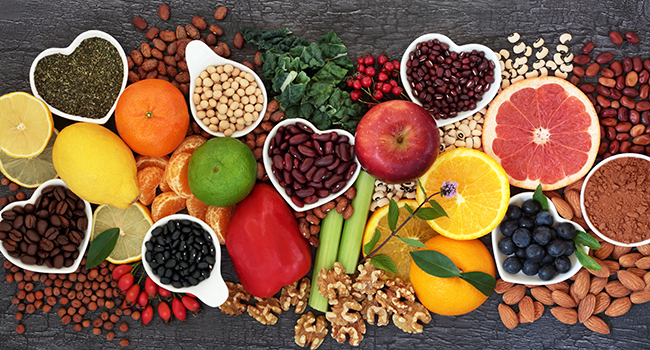May 18, 2023
The Vibrant Polyphenols

By Ram Rao, Ph.D., Principal Research Scientist for Apollo Health
By now, most of you are familiar with the Bredesen Seven (B7) — seven foundational strategies that allow the brain to heal and grow new neuronal connections in response to stimuli. Optimal nutrition is one of the most important of the B7 strategies and is paramount for preventing and reversing cognitive decline. Food provides raw materials for synaptic support, prevents nutrient deficiencies, and protects against muscle and bone loss associated with cognitive decline. Vegetables, herbs, teas, oils, and a subset of fruits are rich in one specific nutrient called polyphenols — components that provide immense nutritional power.
“Poly” comes from the Greek word polus, meaning ‘many/plenty’ and ‘phenol’ refers to an aromatic phenyl ring containing a hydroxyl (-OH) group — the term “polyphenol” refers to a class of compounds found in many plants that provide immense health benefits. There are more than 8,000 different types of polyphenols that have been identified so far. Notable ones include and are not limited to:
Flavonoids These account for around 60% of all polyphenols. Examples include quercetin, kaempferol, catechins, and anthocyanins. These are generally found in fruits, non-starchy vegetables, green tea, dark chocolate, and olive oil.
Phenolic acids This group accounts for around 30% of all polyphenols. Examples include stilbenes and lignans that are present in fruits, vegetables, seeds, and oils.
Polyphenolic amides Capsaicinoids present in chili peppers and avenanthramides in oats are examples of this category of polyphenols.
Others Other notable polyphenols include resveratrol in grapes, ellagic acid in berries, curcumin in turmeric, and lignans in flax seeds, sesame seeds, and olive oil.
Most polyphenols neutralize health-damaging factors like UV light, toxic chemicals, and other environmental toxins. Several studies suggest that diets rich in polyphenols may offer protection against numerous health conditions. Polyphenols exert anti-oxidative activity by scavenging free radicals or by activating the endogenous defense system.
Role in Sugar Metabolism
Polyphenols help lower blood sugar levels, thus offering protection against diabetes. They prevent the breakdown of starch into simple sugars, thereby lowering the likelihood of sugar spikes after meals. Polyphenolic compounds stimulate the secretion of insulin, and among polyphenols, studies suggest that anthocyanins present in various berries and colored vegetables may offer the most potent anti-diabetic effect.
Role in Heart Disease
Polyphenols support heart function and improve heart health by reducing chronic inflammation, lowering LDL levels, and increasing HDL levels. Among the various classes of polyphenols, lignans found in flax seeds and olive oil offers the best protection for the heart.
Prevention of Blood Clots
Excess platelet aggregation can cause blood clots which can have negative health effects. Polyphenols reduce the risk of developing blood clots by breaking apart platelet aggregates.
Cancer
Research consistently links polyphenols to a lower risk of cancer. Since they have strong antioxidant and anti-inflammatory effects, intake of polyphenolic foods may be beneficial for cancer prevention.
Gut Microbiome
Polyphenols enhance digestion by promoting the growth of beneficial gut bacteria like bifidobacteria while fending off harmful ones.
Brain function
Polyphenol-rich foods improve blood flow to the brain, reduce metal toxicity and inflammation, and modulate the release of various neurotransmitters, thereby providing neuroprotection. Furthermore, they aid in reversing insulin resistance, improve cholesterol profiles, and contribute to improved cognition, memory, learning, and attention.
Combining non-starchy vegetables from every color of the rainbow with high polyphenol-containing extra virgin olive oil (EVOO) provides a huge load of polyphenols that confer many healthful properties. The polyphenols of olive oil are especially interesting with respect to their well-established beneficial effects on human health and metabolism, as well as the popularity of olive oil in many different diets. Extra virgin olive oil contains the highest level of polyphenols, which are mostly glycides (e.g., oleuropein), phenols (tyrosol, hydroxytyrosol), lignans, and flavonoids.
Thus, in addition to being vibrant and colorful, polyphenols provide numerous protective qualities to the brain and heart. The lack of toxic effects and availability from natural sources make polyphenols attractive as potential therapeutics in Alzheimer’s disease and other neurodegenerative conditions.




